Ecosystem first
Complex societal problems need collaborative, multi-sectoral solutions
What does it mean to say ‘ecosystem first'?
While we believe in the power of technology to enable change, we know that technology is only one piece of the puzzle. To make cities work for citizens requires collaborative efforts that reach across every sector of economy and society. More importantly, we know that such efforts already exist. Irrespective of whether any e-governance initiative is attempted, there are always some individuals and organisations working to address the challenges and governance gaps they see around them. The ecosystem already exists; our task is to facilitate and amplify their efforts.
We place great emphasis on collaboration and co-creation because urban governance is an inherently complex problem. A city is a complex system in itself, and the number of factors that can influence the outcomes of any governance effort span multiple domains – social, economic, political, cultural, environmental, etc. If one cares about the experiences of every last citizen, then one has to go beyond technological interventions; one has to consider how the entire ecosystem can be mobilised towards improving outcomes.
We think of the ecosystem in terms of three sectors: samaaj (society), sarkaar (government), and bazaar (market or industry). We know there is a further diversity of actors within each of these sectors – for instance, samaaj can encompass everything from NGOs to community and youth groups to public interest journalism; sarkaar includes central, state, and local governments in India’s federal structure; and bazaar can range from famous and established brands, to traditional small businesses, to exciting new startups.
Our goal is to catalyse collaboration and co-creation across the three sectors, all directed towards addressing the challenges of urban governance and service delivery. An ecosystem first approach means that technology is primarily a tool for communication and facilitation. The ecosystem first approach is what differentiates eGov from organisations that seek to identify “what works” and then scale that solution. Instead, we aim to create networks of trust and partnership that enhance local capacity to solve – so that the diverse challenges of urban India can be met by a wide range of local solutions, each effective in its own context.
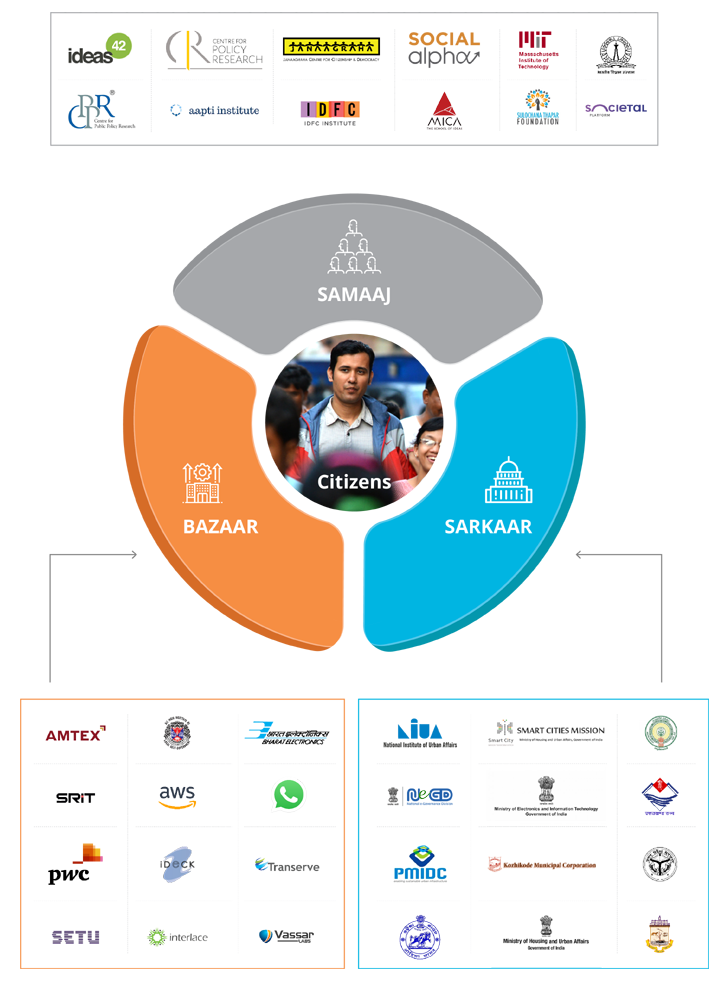
Samaaj
Understanding last-mile access
We believe that citizens should have access to every service they need in a simple, smooth, transparent, and predictable manner. Over the last year, we worked with Omidyar Network India and Aapti Institute, to identify barriers to access and approaches to overcome them. We found that technology benefits both citizens and municipal employees by creating an accessible record of transactions and actions taken, and enhances government responsiveness. For communities who traditionally face discrimination, it acts as a safe bridge to access government and be heard.
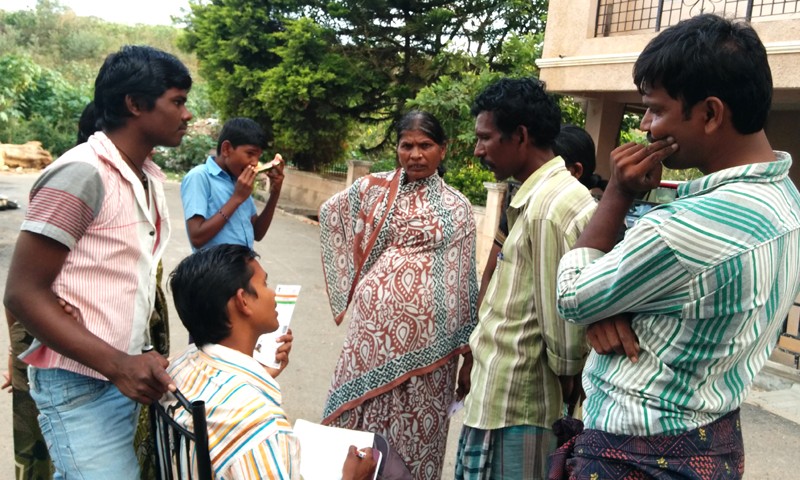
Image Credit: Sarayu Natarajan / Aapti Institute
However, even in 21st-century India, citizens still prefer the human experience, choosing to access government through trusted channels like community-based organizations, local public leaders, party cadres, and trusted government officers. These intermediaries are rarely considered when designing e-governance systems and reforms. To empower local communities, it is important to work with these intermediaries, and to amplify their efforts to serve citizens. We plan to build on this work by exploring how proactive intermediation could bridge gaps in access.
We are also collaborating with Reap Benefit, to support their mission to create “100,000 youth as changemakers & citizen problem solvers”. Our partnership will help these youth to address issues at a local community level. Reap Benefit will mentor the youth, build a community of citizen problem solvers, and create templates which can be replicated and localised across India.
Practical and scalable innovations for sanitation
Inadequate sanitation is a serious public health and development challenge. Across the country, about 60% of urban households are not connected to sewers. They rely on septic tanks, which need to be emptied in a timely manner, with the waste being transported to Faecal Sludge Treatment Plants (FSTPs). There are multiple gaps and challenges in this entire value chain - known as Faecal Sludge Management (FSM) - in India today.
Addressing these gaps has been a policy priority for India, with the AMRUT Mission allocating funding for FSTPs, and the Swachh Bharat Mission driving cities and states to construct and maintain indoor toilets. Gaps in baseline data and inadequate monitoring hamper the effectiveness of these efforts. Digitally-enabled systems are required to ensure that collection, treatment, and disposal are timely, reliable, and safe.
eGov aims to create a population-scale shared digital infrastructure for sanitation. We are working with partners like the Centre for Policy Research (CPR), Indian Institute of Human Settlements (IIHS), Janaagraha, and the Bill and Melinda Gates Foundation to develop a platform for non-networked sanitation.
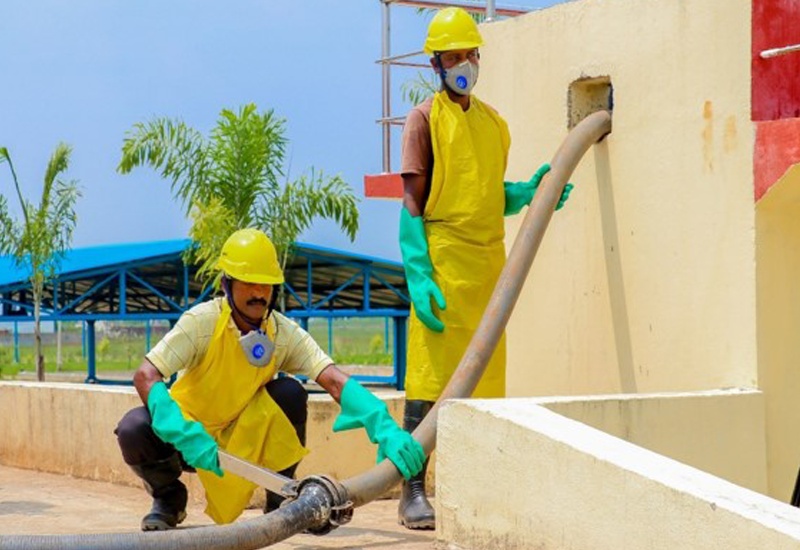
Image Credit: Scaling City Institutions for India, Centre for Policy Research
Sarkaar
Designing for the long tail
The reality of urban governance in India is one of varied outcomes at multiple levels. States vary in their degree of e-governance experience and the resources they have dedicated to tech-enabled reforms. While a few states have implemented a truly state-wide e-governance system, in most states, there are variations in e-governance maturity, capacity, and outcomes from one city to the next.
India has a long tail of nearly 4000 small cities and towns - the vast majority of which have populations below 1,00,000 and continue to struggle with resource-constrained governments, often still maintaining pen-and-paper operations.
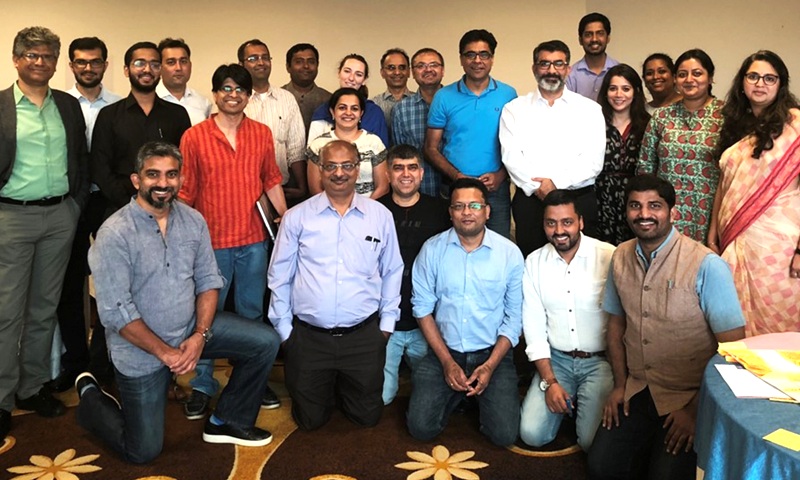
Co-creating NUIS: Design Thinking Workshop
It is this “long tail” for whom the National Urban Innovation Stack (NUIS) is planned, and it is their needs and realities that have been kept in mind while designing the platforms and programs that makeup NUIS. The goal is that state and city governments will find it cost-effective and simple to implement urban e-governance systems in every city at speed and scale.
Institutionalising e-governance at national scale
The Ministry of Housing and Urban Affairs (MoHUA) has set an ambitious goal of ensuring that India’s 4400+ cities will achieve digitally-enabled governance by 2024. Over the past three years, we have engaged deeply with MoHUA and the National Institute of Urban Affairs (NIUA) to support this mission.
Timeline of our engagement with MoHUA and NIUA


Timeline of our engagement with MoHUA and NIUA
Policies:
We helped convene a diverse set of partners to co-create the National Urban Innovation Stack (NUIS) strategy. In the spirit of the 74th Constitutional Amendment, NUIS is calibrated to empower and enable India’s cities and communities through shared digital infrastructure. Similarly, we supported the creation of the DataSmart Cities policy and the accompanying Data Maturity Assessment Framework, along with partners
Standards:
We have been active participants in the standards development effort driven by the Bureau of Indian Standards (BIS) and MoHUA. Standardisation will provide a common playing field for multiple stakeholders to solve urban challenges while also establishing minimum guarantees of quality for e-governance systems, processes, and implementations.
Institution-building:
The Centre for Digital Governance (CDG) has been established at NIUA to serve as the anchor institution for NUIS. The CDG will support state and city governments with trusted advisory, standards, digital infrastructure, and process guidance on leveraging technology for urban development. We are actively supporting the CDG as it initiates a series of programs to achieve country-wide urban e-governance in keeping with MoHUA’s vision.
Bazaar
First partner-led implementation - Chandigarh
eGov believes widening market participation is the way to improve profitability and impact for all our partners. We work with major market players, as also with entrepreneurs and smaller businesses, training and enabling them to build and deliver solutions on the DIGIT stack. We support our partners in multiple ways, including conducting solution workshops, creating implementation handbooks, and providing hands-on training.
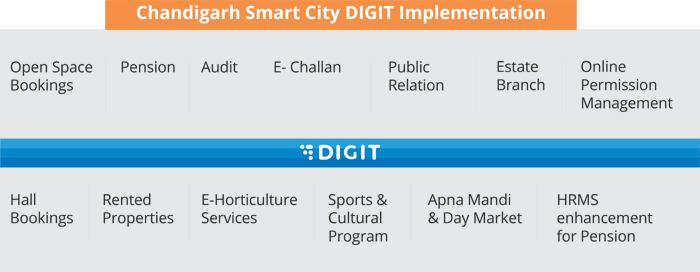
PwC to develop 13 new solutions on DIGIT platform for Chandigarh Smart City
Chandigarh Smart City is home to the first partner-led implementation of DIGIT. PricewaterhouseCoopers (PwC) is using and extending the DIGIT platform to provide a number of citizen services. In addition to deploying the basic modules provided with DIGIT, PwC has led the development of 13 new solutions on the platform - an agile and rapid process that is aimed to be completed in just 6 months.
Virtual enablement during the lockdown
eGov has been interacting with the Directorate General of Defence Estates (DGDE), a department of the Ministry of Defence (MoD), to deploy DIGIT in 62 Cantonment Boards across India. The ‘e-Chhawani program’ aims to standardize and centralize a number of citizen-centric services, through a multi-tenanted platform that offers these services online to Cantonment-area residents.
Since March 2020, meetings with DGDE and the Defence Secretary were conducted virtually, culminating in the virtual signing of an MoU between DGDE and eGov. Bharat Electronics Ltd. (BEL) has been selected to pilot the implementation for the e-Chhawani program. BEL set an ambitious target: to roll out 4 modules (trade licences, mCollect, PGR and web portals) in 5 Cantonments within a span of 4 months.
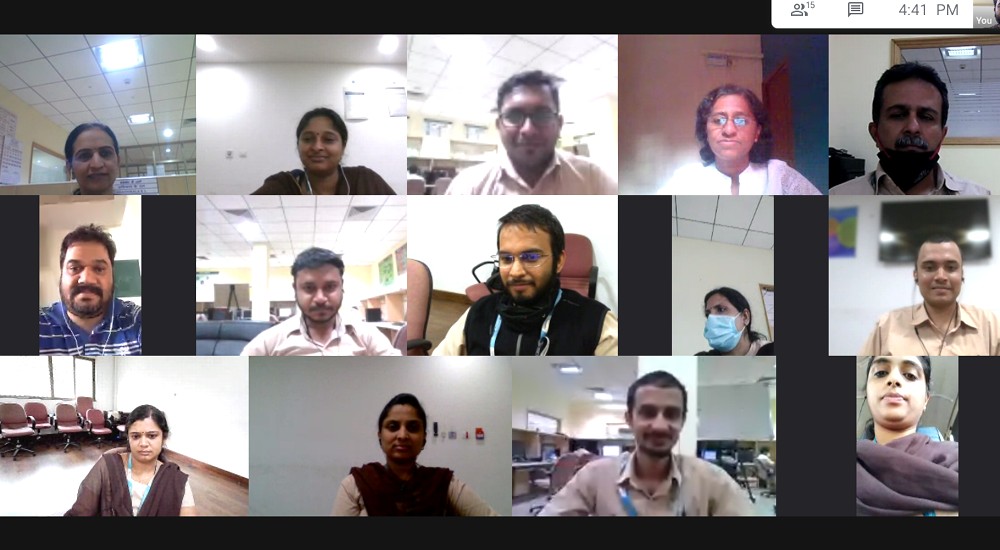
Online Enablement of BEL Team





